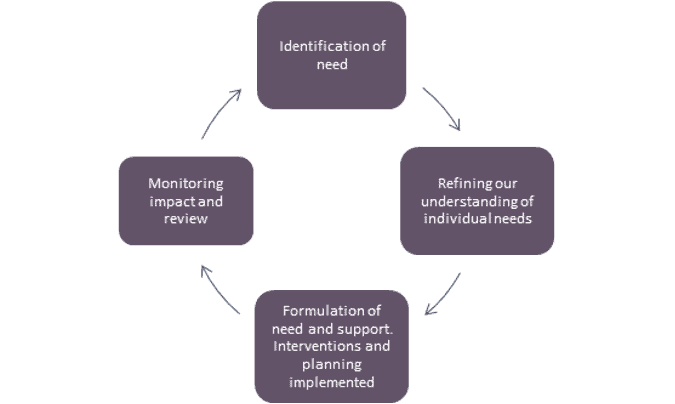SEND provision - Secondary Schools
Learning Support Assistants (LSA)
Our Learning Support Assistants (LSAs) support students both in lessons and around the school. They are assigned to specific year groups, allowing them to become well-acquainted with the students they support and gain a deep understanding of their individual needs.
Our LSAs support all of the students in a classroom, providing assistance to any student who requires it on a lesson-by-lesson basis.
LSAs strive to ensure that no student stands out as needing more support than others. They work alongside the teacher to support the class as a whole and collaborate effectively to ensure that every student makes good progress.
Our LSAs provide feedback for student reviews on progress within specific lessons, and will communicate any issues or successes that arise throughout the school day directly to our SEND Leads.
Our LSAs may do some intervention with students on a one-to-one basis or mentor students where necessary. Additionally, they support designated form groups during registration time, helping students settle into the new school day. They also provide support with homework after school.
Interventions
Any interventions that are put in place are constantly monitored to keep measuring impact. This is done through the following mechanisms:
- Re-assessment using parallel tests to the ones administered in the baseline
- Analysis of progress across the curriculum using DALPs (Data Assessment and Learning Portraits)
- Gaining feedback from teachers with respect to students’ confidence and progress in class
- Student self-assessment pre- and post-intervention
- Review mechanism through termly SEND reviews, informed by feedback from a range of school staff.
- Discussions and communication with parents/carers
We recognise that certain difficulties may be deeply ingrained and long-term in nature. As a result, there are no ‘quick-fixes’. Instead, we acknowledge that some students may need regular and repeated interventions. We maintain a sense of professional curiosity, continuously asking, “what else can we do here?”

Three strands of intervention
We have numerous interventions that are personalised and bespoke to our students’ needs. There are three main strands to our intervention:
Literacy
We want all students to have a level of literacy that matches their cognitive ability. Every student working significantly below their peers will receive targeted intervention from our literacy specialists.
The intervention they receive will be matched to their specific needs and a range of diagnostic testing will be used to ascertain exactly what those needs are. The intensity of intervention will be driven by the severity of need.
Interventions offered include:
- Fresh Start, Toe by Toe, Guided reading, Spellzone, Bedrock
Numeracy
We want all students to have at a level of numeracy that matches their cognitive ability. Students with significant difficulties will work as part of a small group supported by a numeracy specialist.
Mathematical confidence and resilience will be nurtured as part of this group and students will be supported to develop their understanding of the mathematical models used across the curriculum.
Interventions offered include:
- Targeted Numeracy, Fit 4 Figures, Power of Two, IXL, Small Group Teaching
Social, Emotional and Mental Health (SEMH)
We want all students to be emotionally articulate, self-aware and resilient. We recognise that our most vulnerable students may have experienced traumatic and adverse childhood events, and may therefore require extra support.
Intervention in this area targets a broad range of behaviours and needs, from anxiety, self-esteem and social skills to depression and emotional self-regulation. The breadth of this intervention is matched with a wide range of expertise from pastoral and SEND staff. These teams work together closely to assess the needs of students and efficiently identify the best response or intervention.
The main types of intervention run across our Trust are delivered by our SEMH specialists. These fall broadly into the following categories:
SEND Provision
Staffing Structure
The success of our SEND provision
